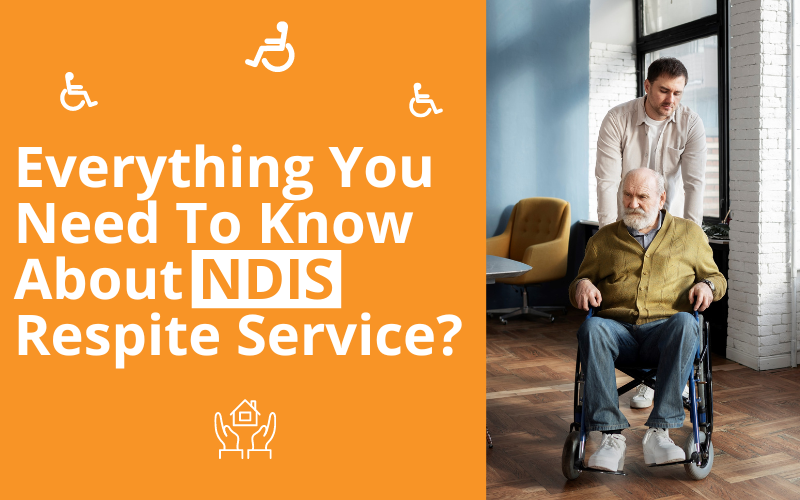38 Dallington crescent Balga WA 6061

The National Disability Insurance Scheme is a well-planned and implemented scheme that continues to offer requisite support, care, and means to people leading their lives with disabilities. Be it to become more self-reliant, cherish the lives of family and friends or improve the quality of life: the core ideologies of NDIS enable you to lead an independent and happy life.
NDIS services are divided into three categories: Core, capital, and capacity. Respite care services fall under the core support services that can be availed by using the funding allocated to particular participants.
Too much to absorb right? Well, let’s simplify everything that is to know about respite care in this blog.
NDIS Respite Services
Respite care services are also known as residential respite or short-term accommodation. NDIS respite accommodation is a crucial part of NDIS offerings that are meant to offer temporary care and support to individuals with disabilities.
Respite care is short-term accommodation that can be extended from a week to a month and more depending on the individual needs of people. It can take place in community centers, group homes, and even at individual homes as requested by the participant.
NDIS respite services are completely customizable. It is tailored to meet the specific requirements of individuals with a unique disability.
As we know all sorts of disability are different. Some individuals may seek assistance with daily living tasks, while some might have specific medical requirements that a respite care provider must offer.
While opting for respite care, a participant gets stability and continuity in receiving care at an appropriate level.This helps promote independence and well-being even as they stay away from their primary caregiver.
Respite services are designed so that caregivers and family members can get the required break from caregiving responsibilities. Being a caregiver can get overwhelming at times, especially when the disabled individual is completely dependent on the caregiver. Getting time away from caregiving responsibility allows the caregiver and family members time to refresh and relax.
This form of short-term accommodation care is in favor of both, the participant (disabled) and their family and caregivers.
Let’s now explore the potential benefits of respite services.
Benefits of NDIS Respite
Wondering why respite care is so important to caregivers as well as disabled participants. Let us tell you a few very prominent benefits that respite care has to offer.
- Relief to carers :
Caring is a core human nature. However, when it comes to taking care of someone with a disability, it can get overwhelming and demanding over time. It could get challenging and might take a toll on caregivers’ physical and emotional health. In order to offer quality care consistently, personal caregivers do require some time off.Respite care services enable caregivers to take that time off by offering quality services for their loved ones. They can relax and recharge themselves freely by knowing that their loved ones are in safe hands.
- Customized support :
Respite care services aren’t stringent. The services can be molded and adapted flexibly as per individual needs. Firstly, they can be availed in multiple settings including the participant’s home. Secondly, every individual seeks different care. Be it assistance with daily living, therapy support, or assisting someone with special medical requirements, respite care providers tailor the services to meet participants’ needs.
- Support during transitions :
Respite services are quite beneficial when a person with a disability is transitioning from one living place to the other. In respite care specific arrangements are taken care of, enabling the participants to live comfortably without much hassle. Transitions are disruptive. However, efforts are being made to make transitions smooth and less disruptive through respite care.
- Helps in skill development and social skills :
Respite care is much more than mere accommodation care services. Individuals with disabilities crave social meaningful activities and relations. In a group setting and community centers while availing respite care, individuals get an opportunity to interact with people and build friendships.Moreover, they can participate in varying activities, events, and workshops empowering them with new skill sets. The participants feel happy and fulfilled while living in an environment that’s nurturing and supportive.Overall, respite care helps foster a sense of independence and promotes quality of life amongst participants.
How to Access NDIS Respite?
NDIS has a set of rules and eligibility criteria to be eligible for it. Here is how you avail respite care from NDIS.
- Be eligible for NDIS. To avail of respite care you need to be a NDIS participant. Send your application to NDIA. After reviewing the application they will arrange a planning meeting.
- In the planning meeting, plan respite care services with your NDIA planner. This plan is important as it outlines the support and funds you will receive in individual areas.
- Choose from a list of registered NDIS respite service providers. Consider the type of respite care you need at this stage.
- Develop a respite care schedule with the chosen service provider.
- Now, utilize your NDIS funding when required. The services will be funded through an allocated budget in your NDIS plan.
- You get to review and adjust your respite arrangements in the NDIS plan.
Q & A
1. How can you include Respite in your NDIS plan?
To include respite in your NDIS plan, ask your NDIA planner to include respite care services in your plan. If deemed fit by the eligibility standards, they will include respite care in your plan.
2. Can I use NDIS Core Support for Respite?
Yes, you can. If respite services are included in your NDIS plan, you can use the allocated budget for availing respite services.
